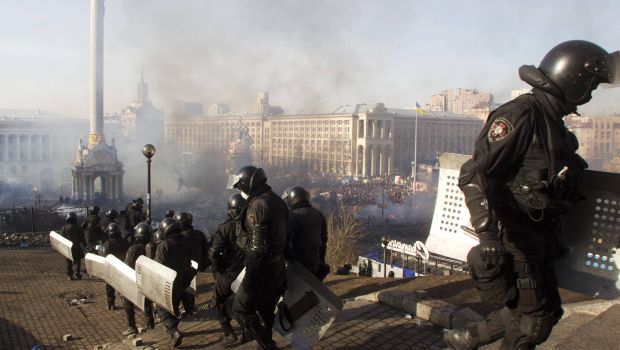
Interior Ministry officers walk in formation as smoke rises above Independence Square where anti-government protesters are holding a rally in central Kiev February 19, 2014. REUTERS/Stringer
Thousands of defiant protesters faced rows of riot police who have squeezed them deeper into the Kiev’s Independence Square, known as the Maidan, which has been a bastion for protesters, after overnight clashes that set buildings on fire and brought sharp rebuke from both the West and Russia.
The violence on Tuesday was the worst in nearly three months of anti-government protests that have paralyzed Ukraine’s capital in a struggle over the identity of a nation divided in loyalties between Russia and the West, and the worst in the country’s post-Soviet history.
The protests began in late November after President Viktor Yanukovych turned away from a long-anticipated deal with the European Union in exchange for a 15 billion US dollar bailout from Russia. The political maneuvering continued ever since, with both Moscow and the West eager to gain influence over this former Soviet republic.
The latest bout of street violence began Tuesday when protesters attacked police lines and set fires outside parliament, accusing Yanukovych of ignoring their demands to enact constitutional reforms that would limit president’s power—a key opposition demand. Parliament, dominated by his supporters, was stalling on taking up a constitutional reform to limit presidential powers.
In the evening police attacked the protest camp. Armed with water cannons, stun grenades and rubber bullets, police dismantled some barricades and took part of the Maidan, but the protesters still held their ground through the night, encircling the camp with new burning barricades of tires, furniture and debris.
On Wednesday morning, the center of Kiev was cordoned off by police, the subway was shut down and most shops on Kiev’s main street were closed. But hundreds of Ukrainians still flocked to the opposition camp, some wearing balaclavas and armed with bats, others, in every-day clothes and with make-up on, carrying food to protesters.
A group of young men and women poured petrol into plastic bottles, preparing fire bombs, while a volunteer walked past them distributing ham sandwiches to protesters from a tray. Another group of activists was busy crushing the pavement into pieces and into bags to fortify barricades.
“The revolution turned into a war with the authorities,” said Vasyl Oleksenko, 57, a retired geologist from central Ukraine, who said he fled the night’s violence fearing for his life, but returned to the square in the morning, feeling ashamed. “We must fight this bloody, criminal leadership; we must fight for our country, our Ukraine.”
Yanukovych on Wednesday blamed the protesters for the violence and said the opposition leaders “crossed a line when they called people to arms.”
“I again call on the leaders of the opposition…to draw a boundary between themselves and radical forces which are provoking bloodshed and clashes with the security services,” the president said in a statement. “If they don’t want to leave [the square]—they should acknowledge that they are supporting radicals. Then the conversation with them will already be of a different kind.”
His defiant tone left few with hope of compromise after a night of violence.
The Health Ministry said 25 people died in the clashes, some from gunshot wounds, and Kiev hospitals were struggling to treat hundreds of injured. Activists also set-up a makeshift medical unit inside an landmark Orthodox Church not far from the camp, where volunteer medics were taking care of the wounded.
Tensions soared after Russia said Monday that it was ready to resume providing the loans that Yanukovych’s government needs to keep Ukraine’s ailing economy afloat. This raised fears among the opposition that Yanukovych had made a deal with Moscow to stand firm against the protesters and would choose a Russian-leaning loyalist to be his new prime minister.
The deadly clashes have drawn sharp reactions from Washington and generated talk of possible European Union sanctions. Russia has blamed the West for the unrest.
Swedish Foreign Minister Carl Bildt made an unusually strong statement Wednesday, putting the blame on Yanukovych.
“Today, President Yanukovich has blood on his hands. And I fear that the way he has now embarked on will lead to even more of suffering and violence…The crisis for the country will be deepened and extended. I feel deeply concerned,” Bild to parliament in a statement Wednesday.
